Let me begin by admitting that I am by no means an expert on Islam or the Islamic world and I am sure there are nuances that escape me -- shades of distinction that might make a difference in my arguments, one way or the other. I am just an ordinary, reasonably well-read American who, like many such, has been trying to wrap his head around the problem of Islam. Because the fine distinctions are difficult for me I will stick to a couple of
hit-you-over-the-head obvious observations that many people seem to have missed.
Consider these three statements:
"Islam is
the problem."
"Islam is
a problem."
"Islam
has a problem."
The first statement -- "Islam is
the problem" -- is clearly false, at least without additional qualifications. To be defined using the definite article a problem needs to be bigger. "Knowing the mind of God" might well be "
The" Problem, if you are religious, or "Deciding how best to use your life," if you are not, or "Where to find 'organic' seaweed to roll your sushi" if you are from California. Whatever you may think of Islam, there are other problems we face, individually and collectively, that are at least as pressing.
On the other hand, the last statement above is clearly true. Islam plainly
has a problem. There are elements within Islam who, in the name of Islam, delight in provoking the powerful governments of the West. They seek to polarize relations between the Islamic and non-Islamic worlds and to isolate the Islamic population from what they perceive as corrupting western influences. They plan to use this isolation to establish a sphere of influence in which they can operate and then to work to widen their caliphate to the rest of the world. If you support their objectives then the "problem" is keeping the various factions in Islam in line to present a united front until the Great Satan can be forced to retreat. If you oppose them the "problem" is to isolate them so they can be acted against in a targeted fashion without letting them, in effect, use the rest of the Islamic world as hostages. There is some disagreement as to which of these problems holds but nobody denies that there is a problem.
As to the second statement -- "Islam
is a problem" -- it remains to be seen whether it is true or not. The decision is largely up the Islamic community. If they decide to close ranks and present a united Islamic front to the west (as the extremists among them hope they will do) then, from a western point of view, the statement becomes true. If, on the other hand, they decide that the extremists are a liability -- needlessly antagonizing the western powers in an effort to bring about an strict theocracy that few in the Islamic world really want -- then it is unfair to hold all of Islam responsible for the insanity of the few.
One can find writers who support each of the three versions of the problem of Islam. Italian journalist Oriana Fallaci (
Wikipedia Bio) is one who comes to mind for the "Islam is
the problem" view. She has had a long and interesting career starting in the anti-Mussolini resistance in WWII, becoming a trendy celebrity journalist who got interviews (often exclusive ones) with everybody famous or infamous in the 1960s and 1970s, and more recently writing increasingly cranky books and articles about Islam. She is currently charged with criminal disparagement of a religion in her native Italy and is scheduled to go on trial next year. She lives in the US and doubts that she will return to Italy to stand trial. She doubts it in part because she finds the charges ridiculous, but largely because she has terminal cancer and it is unlikely that her health will permit her to return to Italy, even if she lives that long.
I was reminded of her by a brief posting in Sunbreak City (
Oriana's Poisoned Apples) that was critical of her views. I usually agree with Das Anderson (the proprietor of Sunbreak City) but I think he was a bit too hard on Fallaci in describing her writings on Islam as poisonous and hate-filled. I read her articles (parts
one,
two,
three and
four) which he was discussing and found them shrill, one-sided, overgeneralized and rather angry but nonetheless within the allowable limits for a really-pissed-off polemicist. She raises a number of issues that are worthy to be considered, even if many can be subsequently rejected on merit.
I worry that we no longer are comfortable discussing foundational issues -- when people point out intractable problems we assume that they have selected those particular problems to complain about
because they are intractable. We assume people talking about these problems are not so much interested in seeking solutions as merely spewing hatred. It may well be that Oriana "hates" the Islamic world. But a number of the things she writes about may still be true.
Other, less phlegmatic writers have written about the problem of Islam and the West and have come to similar conclusions, even if their style of presentation is less angry than Oriana's. Wretchard, the proprietor of the Bemlont Club, worries that the West fails to grasp the global scale of the goals of Islamism in "
The Provincial West." Victor Davis Hanson has looked at the question of whether Islam is in need of revolution or reformation in "
Reformation or Civil War?" in National Review. Salmon Rushdie remains calm in "
Muslims unite! A new Reformation will bring your faith into the modern era" from the Times Online when one could forgive him for ranting. Rushdie has at least as much reason to be paranoid about extremist Islam as does Fallaci -- there is an official Fatwah calling for Rushdie's death while the widely-circulated pamphlet calling for Fallaci's death has no official standing.
One need not be a supporter of the "War on Terror" to worry that accusations of "hate" speech can stifle serious discussion of Islam. Joe Sobran is
no fan of the Iraq war or the current administration but still worries about suppression of free speech in "
What is this thing called Hate?." [
Note: I am a long-time fan of Joe Sobran but disagree with him most of the time since 9/11.]
With the notable exception of Paleocons like Sobran, it is not difficult to imagine that many of the most vocal opponents of the efforts to confront and contain radical Islam have taken their positions simply because a conservative was in the White House when the Twin Towers came down -- and particularly because that conservative was George W Bush. Many conservatives, myself included, are grateful that it was Bush and not Gore who was president on Sept 11, but if it had been Gore I tend to suspect that he too would see that the attack needed more of a response than an Interpol investigation and some unavailing complaints to the UN.
Because they oppose the war and need to explain why, many Liberals will reach for the moral-equivalence argument when pressed. It goes like this: fundamentalist Islam has its dangerous kooks but so do other religions, especially Christianity and Judaism. This is true, to a certain extent, but Christianity has its more-dangerous kooks mostly marginalized. Christian churches may well close ranks to defend the Seventh-Day
Banana-Man types (who believe that on the seventh day of creation God pulled the Earth out of his baggy pants, saying Aaahhhhh!) but when you start blowing things up they cut you loose. This may not have always been true but it seems to be true now.
Unfortunately, it is less clear that Islam has decided to marginalize their dangerous "kooks" -- and it is not just the kooks who are dangerous. From a Classical Liberal point of view there is much to dislike about the Islamic "mainstream." For instance, "
Honor Killings of young women are quite common in places like Jordan and Saudi Arabia -- if you are a young Jordanian woman and your father or your brother don't like your boyfriend there is a fair chance that you may wind up dead and your death will not be investigated or any charges made against your killers. (See "
Death by Sharia: Reviewing Norma KhouriÂ’s Honor Lost." from NR, or "
The Vanishing Victim: Criminal Law and Gender in Jordan" from Law & Society Review, Jun 2005, by Catherine Warrick.)
I will close with a snippet from al Koran from
The University of Michigan's online text. As I write this paragraph the date is August 14th so I will quote the five verses centering on 8.14.
[8.12] When your Lord revealed to the angels: I am with you, therefore make firm those who believe. I will cast terror into the hearts of those who disbelieve. Therefore strike off their heads and strike off every fingertip of them.
[8.13] This is because they acted adversely to Allah and His Apostle; and whoever acts adversely to Allah and His Apostle-- then surely Allah is severe in requiting (evil).
[8.14] This-- taste it, and (know) that for the unbelievers is the chastisement of fire.
[8.15] O you who believe! when you meet those who disbelieve marching for war, then turn not your backs to them.
[8.16] And whoever shall turn his back to them on that day-- unless he turn aside for the sake of fighting or withdraws to a company-- then he, indeed, becomes deserving of Allah's wrath, and his abode is hell; and an evil destination shall it be.
So there you have it. Today's reading from the
Religion of Peace. I am all for the people who are working on a pastoral, live-and-let-live reformation of Islam. I am rooting for them and vaguely hopeful for their success, but you gotta admit based on todays reading: they have their work cut out for them.
More resources for Oriana Fallaci Information
Prophet of Decline: An interview with Oriana Fallaci.Wall Street Journal Opininon Journal, June 2005, by Tunku Varadarajan
Oriana Fallaci: Biographical Informationfrom Giselle.com
Oriana in ExileAmerican Spectator, by Christopher Orlet



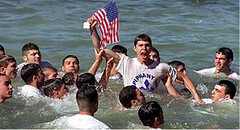

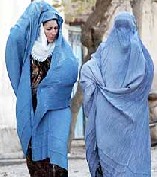 I worry a bit
I worry a bit
 It's
It's 
 OOPS. I wasn't paying attention and I seem to have accidentally become a Disney Store. A few years ago when my wife and I unhandily found that we were both unemployed at the same time I put both our resumes up on one of my web sites. We have since both found jobs and I forgot that the page was out there. There was little enough interest in the page back when we were both looking for work and recently the only ones to visit it are internet spiders -- programs that follow random links on the web looking for this and that.
OOPS. I wasn't paying attention and I seem to have accidentally become a Disney Store. A few years ago when my wife and I unhandily found that we were both unemployed at the same time I put both our resumes up on one of my web sites. We have since both found jobs and I forgot that the page was out there. There was little enough interest in the page back when we were both looking for work and recently the only ones to visit it are internet spiders -- programs that follow random links on the web looking for this and that.  The Sunnis in Iraq have decided to support the new Constitution after a few minor last-minute concessions were made. According to
The Sunnis in Iraq have decided to support the new Constitution after a few minor last-minute concessions were made. According to  People have been writing that Prez Bush picked Harriet Miers for the Supreme Court because of "Cronyism." That's cold, dude. I mean, like, she's no spring chick -- but I don't think she looks like a crone and I don't think Dubbya picked her just because she is old and wrinkled. She does sorta look like one of my mom's friends at church when I was a kid -- the older lady who always brought the three-bean salad to the Wednesday night pot-luck supper in the parish hall. She was Mrs. Somebody (I don't remember her name) and there never seemed to be a Mr. Somebody around so she might have been a widow, or she might have been divorced, or maybe Mr. Somebody didn't like three-bean salad. I never wondered about it then and its too late to wonder about it now. It doesn't matter. The thing is that in her hair-sprayed, funny-smelling way she was a good person -- and I'm sure Harriet Miers is too.
People have been writing that Prez Bush picked Harriet Miers for the Supreme Court because of "Cronyism." That's cold, dude. I mean, like, she's no spring chick -- but I don't think she looks like a crone and I don't think Dubbya picked her just because she is old and wrinkled. She does sorta look like one of my mom's friends at church when I was a kid -- the older lady who always brought the three-bean salad to the Wednesday night pot-luck supper in the parish hall. She was Mrs. Somebody (I don't remember her name) and there never seemed to be a Mr. Somebody around so she might have been a widow, or she might have been divorced, or maybe Mr. Somebody didn't like three-bean salad. I never wondered about it then and its too late to wonder about it now. It doesn't matter. The thing is that in her hair-sprayed, funny-smelling way she was a good person -- and I'm sure Harriet Miers is too. OK, I do know the meaning of the word "Cronyism" and I can see how it applies -- but I must admit I have always thought it to be an overrated vice since it is the opposite of credentialism which is worse. I'll talk more about the Miers nomination in a minute, but first a non-sequitur.
OK, I do know the meaning of the word "Cronyism" and I can see how it applies -- but I must admit I have always thought it to be an overrated vice since it is the opposite of credentialism which is worse. I'll talk more about the Miers nomination in a minute, but first a non-sequitur.  Serenity
Serenity

 "Man said to be Zarqawi's No. 2 killed"
"Man said to be Zarqawi's No. 2 killed"

 After over a century of publication, the University of North Carolina's student newspaper, the Daily Tarheel, faces a crisis -- one it is not clear they can survive. Recent events suggest that there may soon be no one left to write for them.
After over a century of publication, the University of North Carolina's student newspaper, the Daily Tarheel, faces a crisis -- one it is not clear they can survive. Recent events suggest that there may soon be no one left to write for them.
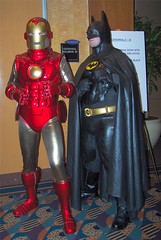
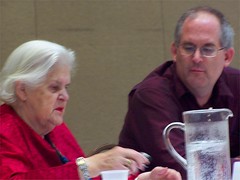
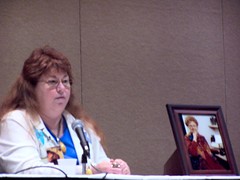

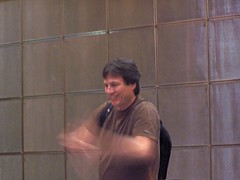

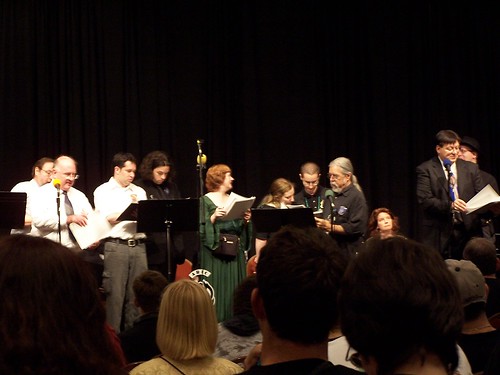
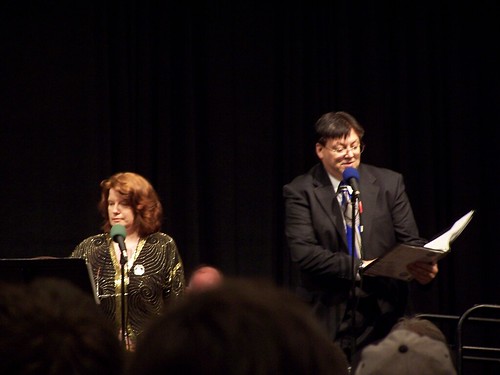



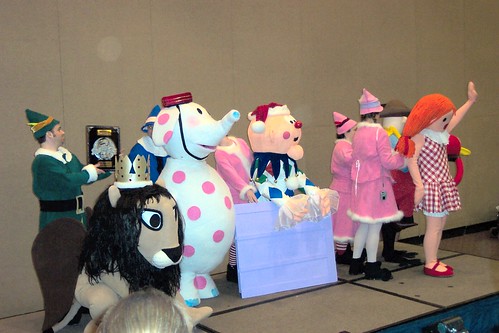


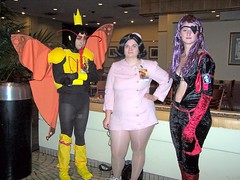





 A young man from New Orleans has put up a
A young man from New Orleans has put up a  For those of you who can see the right-hand column of my blog* there is a section of links under the heading Military Blogs. These are blogs that are either authored by members of the military or by writers embedded with the military in either Iraq or Afghanistan. The contents of this list will change from time to time as new blogs catch my attention. Occasionally I will mention some of these new blogs in a posting such as this one.
For those of you who can see the right-hand column of my blog* there is a section of links under the heading Military Blogs. These are blogs that are either authored by members of the military or by writers embedded with the military in either Iraq or Afghanistan. The contents of this list will change from time to time as new blogs catch my attention. Occasionally I will mention some of these new blogs in a posting such as this one.

 In his posting of September 17th, 1787 proto-blogger Ben Franklin writes:
In his posting of September 17th, 1787 proto-blogger Ben Franklin writes: Updates below. Fri, Aug 26
Updates below. Fri, Aug 26


 This is Snuppy. He is an Afghan Hound and he is a clone -- the first of his kind. (Image is an excerpt from an AP photo
This is Snuppy. He is an Afghan Hound and he is a clone -- the first of his kind. (Image is an excerpt from an AP photo